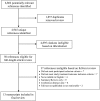Hearing Loss Treatment in Older Adults With Cognitive Impairment: A Systematic Review
- PMID: 30304320
- PMCID: PMC6428235
- DOI: 10.1044/2018_JSLHR-H-18-0077
Hearing Loss Treatment in Older Adults With Cognitive Impairment: A Systematic Review
Abstract
Purpose: The purpose of this systematic review was to assess studies of treating hearing loss in older adults with cognitive impairment. Of interest to this review is identifying clinical adaptations that may be used to tailor hearing loss treatment to older adults with cognitive impairment in order to better serve this vulnerable population.
Method: A systematic search with controlled vocabulary and key word terms was applied to PubMed, the Cochrane Library, Embase, CINAHL, and PsycINFO. Search concepts included terms related to hearing loss and cognitive impairment. The overall search resulted in 4,945 unique references, 50 of which were eligible for full-text review and 13 of which were included in the final review. Included manuscripts were categorized according to the American Speech-Language-Hearing Association's levels of evidence and the National Institutes of Health Quality Assessment Tools.
Results: Only 1 study implemented a randomized controlled trial design to assess cognitive function and behavioral symptoms after treatment with hearing aids. Other quasiexperimental studies evaluated dementia-related symptoms and/or auditory function after treating hearing loss in pre/post research designs. Finally, evidence from case studies suggested that hearing loss treatment is feasible, reduces stressful communication for caregivers, and improves dementia-related behavior problems.
Conclusion: Based on the systematic review, evidence suggests that treating hearing loss in persons with cognitive impairment can have benefits to communication and quality of life. Because of the quasi- and nonexperimental nature of most of the evidence found in this review, further studies are necessary to understand the effect of treatment in the context of a variable and progressive disease.
References
-
- Adrait A., Perrot X., Nguyen M. F., Gueugnon M., Petitot C., Collet L., … ADPHA Study Group. (2017). Do hearing aids influence behavioral and psychological symptoms of dementia and quality of life in hearing impaired Alzheimer's disease patients and their caregivers? Journal of Alzheimer's Disease, 58(1), 109–121. - PubMed
-
- Alexopoulos G. S., Abrams R. C., Young R. C., & Shamoian C. A. (1988). Cornell Scale for Depression in Dementia. Biological Psychiatry, 23(3), 271–284. - PubMed
-
- Allen N. H., Burns A., Newton V., Hickson F., Ramsden R., Rogers J., … Morris J. (2003). The effects of improving hearing in dementia. Age and Ageing, 32(2), 189–193. - PubMed
-
- American Geriatrics Society. (2013). Choosing wisely—An initiative of the ABIM foundation. Five things physicians and patients should question. Retrieved from https://www.aafp.org/dam/AAFP/documents/about_us/initiatives/choosing-wi....
-
- American Speech-Language-Hearing Association. (n.d.). Steps in the process of evidence-based practice: Step 3: Assessing the evidence. Retrieved from https://www.asha.org/Research/EBP/Assessing-the-Evidence/
Publication types
MeSH terms
Grants and funding
LinkOut - more resources
Full Text Sources
Medical


